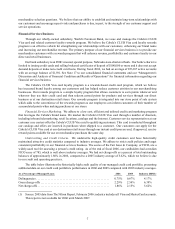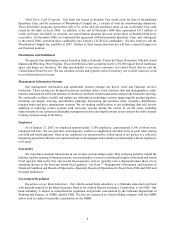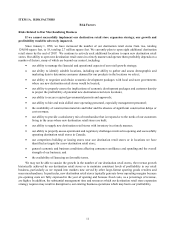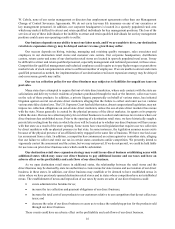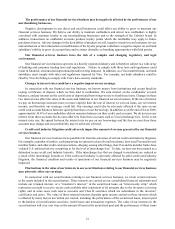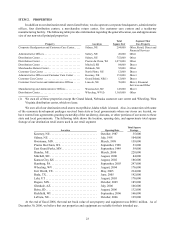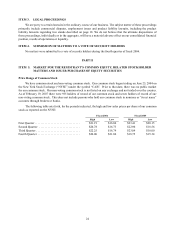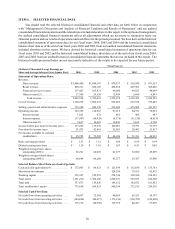Cabela's 2006 Annual Report Download - page 20
Download and view the complete annual report
Please find page 20 of the 2006 Cabela's annual report below. You can navigate through the pages in the report by either clicking on the pages listed below, or by using the keyword search tool below to find specific information within the annual report.16
W. Cabela, none of our senior management or directors has employment agreements other than our Management
Change of Control Severance Agreements. We do not carry key-man life insurance on any of our executives or
key management personnel. In addition, our corporate headquarters is located in a sparsely populated rural area
which may make it difficult to attract and retain qualified individuals for key management positions. The loss of the
services of any of these individuals or the inability to attract and retain qualified individuals for our key management
positions could cause our operating results to suffer.
Our business depends on our ability to meet our labor needs, and if we are unable to do so, our destination
retail store expansion strategy may be delayed and our revenue growth may suffer.
Our success depends on hiring, training, managing and retaining quality managers, sales associates and
employees in our destination retail stores and customer care centers. Our corporate headquarters, distribution
centers, return center and some of our destination retail stores are located in sparsely populated rural areas. It may
be difficult to attract and retain qualified personnel, especially management and technical personnel, in these areas.
Competition for qualified management and technical employees could require us to pay higher wages or grant above
market levels of stock compensation to attract a sufficient number of employees. If we are unable to attract and retain
qualified personnel as needed, the implementation of our destination retail store expansion strategy may be delayed
and our revenue growth may suffer.
Our use tax collection policy for our direct business may subject us to liabilities for unpaid use taxes on
past sales.
Many states have attempted to require that out-of-state direct marketers, whose only contacts with the state are
solicitations and delivery to their residents of products purchased through the mail or the Internet, collect use taxes
on the sale of these products. In addition, a private litigant, purportedly on behalf of various states, has initiated
litigation against several out-of-state direct marketers alleging that the failure to collect and remit use tax violates
various state false claims laws. The U.S. Supreme Court has held that states, absent congressional legislation, may not
impose tax collection obligations on out-of-state direct marketers unless the out-of-state direct marketer has nexus
with the state. Nexus generally is created by the physical presence of the direct marketer, its agents or its property
within the state. Our use tax collection policy for our direct business is to collect and remit use tax in states where our
direct business has established nexus. Prior to the opening of a destination retail store, we have historically sought a
private letter ruling from the state in which the store will be located as to whether our direct business will have nexus
with that state as a result of the store opening. Some states have enacted legislation that requires use tax collection
by direct marketers with no physical presence in that state. In some instances, the legislation assumes nexus exists
because of the physical presence of an affiliated entity engaged in the same line of business. We have received a use
tax assessment from a state. In addition, a competitor has commenced an action against us in another state, alleging
that our failure to collect and remit use tax in certain states constitutes unfair competition. We presently intend to
vigorously contest the assessment and the action, but we may not prevail. If we do not prevail, we could be held liable
for use taxes on prior direct business sales which could be substantial.
Our destination retail store expansion strategy may result in our direct business establishing nexus with
additional states which may cause our direct business to pay additional income and use taxes and have an
adverse effect on the profitability and cash flows of our direct business.
As we open destination retail stores in additional states, the relationship between the retail stores and the
direct business may be deemed by state tax authorities to create nexus for state income and use taxation of our direct
business in these states. In addition, our direct business may establish or be deemed to have established nexus in
states where we have previously opened destination retail stores and in states where competitors have not established
nexus. The establishment of nexus and imposition of use taxes by states on sales of our direct business could:
• create administrative burdens for us;
• increase the tax collection and payment obligations of our direct business;
• increase the total cost of our products to our customers relative to our competitors that do not collect use
taxes; and
• decrease the sales of our direct business or cause us to reduce the underlying prices for the products sold
through our direct business.
These events could have an adverse effect on the profitability and cash flows of our direct business.



